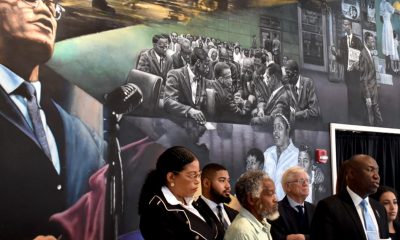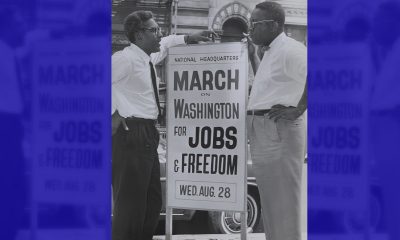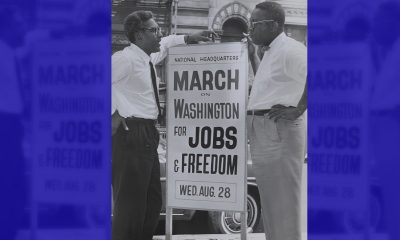Politics
Missouri Town, New Mayor Grapple with Mass Resignations

Tyus Byrd was sworn in as mayor of Parma, Mo., last Tuesday, shortly after five of the city’s six cops and other government officials resigned. (KFVS)
JIM SUHR, Associated Press
ST. LOUIS (AP) — Several residents of a tiny southeast Missouri town said Monday they don’t believe the abrupt resignations of five of six members of the police force after the longtime mayor, a white man, lost to a black woman have anything to do with racism.
The bigger questions among many there: why Parma, a Missouri Bootheel town with just 700 residents, felt the need to have six police officers, and why residents seldom saw any of them on patrol.
Tyus Byrd got 122 votes in Parma’s April 7 election, defeating incumbent Randall Ramsey by three dozen votes of more than 200 cast in the town, which is about 57 percent white and 42 percent black, according to the most recent Census data available.
Just hours before Byrd was sworn in last week, KFVS-TV has reported, three full-time officers and two part-time ones quit without notice, along with Parma’s clerk, city attorney and the wastewater plant’s overseer.
Ramsey told the station the departures were over unspecified “safety concerns.” No resignation letters or the names of those who submitted them have been made public. A number listed for the Parma Police Department rang unanswered Monday.
Byrd, when contacted by The Associated Press on Monday, initially declined to discuss the matter by telephone but relented, saying she could comment after meetings that day. Subsequent calls by the AP to the City Hall went unanswered, as did calls to Ramsey’s home.
Word of the mass exodus sent social media afire, with many news outlets and bloggers speculating the resignations had racial overtones. But several Parma-area residents waved that off Monday, agreeing that Byrd’s victory was more about the need for change in an economically depressed town with little more than a fertilizer merchant, cotton gin and a couple of convenience stores — and that something yet-to-be-revealed explains the departures.
“There was absolutely no racism that had anything to do with this,” said Barry Aycock, a white former alderman. “We had an election, it’s over, and we’re all supporting the new mayor and moving forward.”
Louis Nelson, a black 69-year-old retired railroad foreman who’s lived in the town since 1971, agreed. While crediting Ramsey as a “nice guy” who “talked to me like a man and treated me like a man,” once loaning Nelson use of a backhoe, Nelson said “it was just time for a change” with Byrd, “a well-rounded and intelligent person.”
“Since I’ve been here, it’s like it’s been going downhill,” Nelson said. “And when something is not working, you try something different.”
“Everybody pretty well gets along here,” he added.
Like Nelson, Parma convenience store owner Lisa Kirk found news that the town had a six-person police force curious, saying she seldom saw much of a patrol. Over the past decade, she said, her shop has been burglarized or robbed nine times.
“There was never police around in town,” said Kirk, 58. “We have no idea where the six officers worked or who they are. If they did work, I don’t know where they were.”
Copyright 2015 The Associated Press. All rights reserved. This material may not be published, broadcast, rewritten or redistributed.
Activism
Oakland Post: Week of December 25 – 31, 2024
The printed Weekly Edition of the Oakland Post: Week of December 25 – 31, 2024

To enlarge your view of this issue, use the slider, magnifying glass icon or full page icon in the lower right corner of the browser window.
Alameda County
Last City Council Meeting of the Year Ends on Sour Note with Big Budget Cuts
In a five to one vote, with Councilmembers Carroll Fife and Janani Ramachandran excused, the council passed a plan aimed at balancing the $130 million deficit the city is facing. Noel Gallo voted against the plan, previously citing concerns over public safety cuts, while Nikki Fortunato-Bas, Treva Reid, Rebecca Kaplan, Kevin Jenkins, and Dan Kalb voted in agreement with the plan.
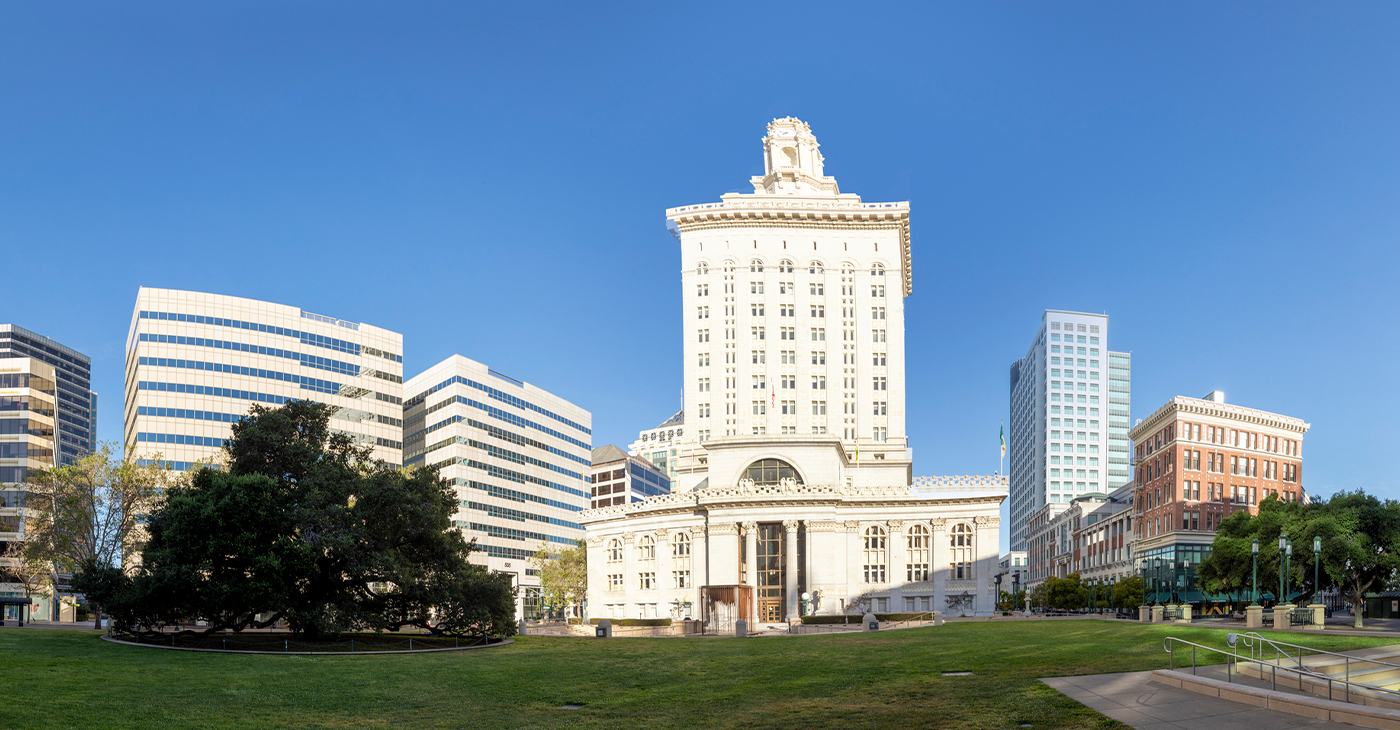
By Magaly Muñoz
In the last lengthy Tuesday meeting of the Oakland City Council for 2024, residents expressed strong opposition to the much needed budget cuts before a change in leadership was finalized with the certification of election results.
In a five to one vote, with Councilmembers Carroll Fife and Janani Ramachandran excused, the council passed a plan aimed at balancing the $130 million deficit the city is facing. Noel Gallo voted against the plan, previously citing concerns over public safety cuts, while Nikki Fortunato-Bas, Treva Reid, Rebecca Kaplan, Kevin Jenkins, and Dan Kalb voted in agreement with the plan.
Oakland police and fire departments, the ambassador program, and city arts and culture will all see significant cuts over the course of two phases.
Phase 1 will eliminate two police academies, brown out two fire stations, eliminate the ambassador program, and reduce police overtime by nearly $25 million. These, with several other cuts across departments, aim to save the city $60 million. In addition, the council simultaneously approved to transfer restricted funds into its general purpose fund, amounting to over $40 million.
Phase 2 includes additional fire station brownouts and the elimination of 91 jobs, aiming to recover almost $16 million in order to balance the rest of the budget.
Several organizations and residents spoke out at the meeting in hopes of swaying the council to not make cuts to their programs.
East Oakland Senior Center volunteers and members, and homeless advocates, filled the plaza just outside of City Hall with rallies to show their disapproval of the new budget plan. Senior residents told the council to “remember that you’ll get old too” and that disturbing their resources will only bring problems for an already struggling community.
While city staff announced that there would not be complete cuts to senior center facilities, there would be significant reductions to staff and possibly inter-program services down the line.
Exiting council member and interim mayor Bas told the public that she is still hopeful that the one-time $125 million Coliseum sale deal will proceed in the near future so that the city would not have to continue with drastic cuts. The deal was intended to save the city for fiscal year 2024-25, but a hold up at the county level has paused any progress and therefore millions of dollars in funds Oakland desperately needs.
The Coliseum sale has been a contentious one. Residents and city leaders were originally against using the deal as a way to balance the budget, citing doubts about the sellers, the African American Sports and Entertainment Group’s (AASEG), ability to complete the deal. Council members Reid, Ramachandran, and Gallo have called several emergency meetings to understand where the first installments of the sale are, with little to no answers.
Bas added that as the new Alameda County Supervisor for D5, a position she starts in a few weeks, she will do everything in her power to push the Coliseum sale along.
The city is also considering a sales tax measure to put on the special election ballot on April 15, 2025, which will also serve as an election to fill the now vacant D2 and mayor positions. The tax increase would raise approximately $29 million annually for Oakland, allowing the city to gain much-needed revenue for the next two-year budget.
The council will discuss the possible sales tax measure on January 9.
Activism
Protesters Gather in Oakland, Other City Halls, to Halt Encampment Sweeps
The coordinated protests on Tuesday in San Francisco, Oakland, Vallejo, Fresno, Los Angeles and Seattle, were hosted by Poor Magazine and Wood Street Commons, calling on cities to halt the sweeps and focus instead on building more housing.
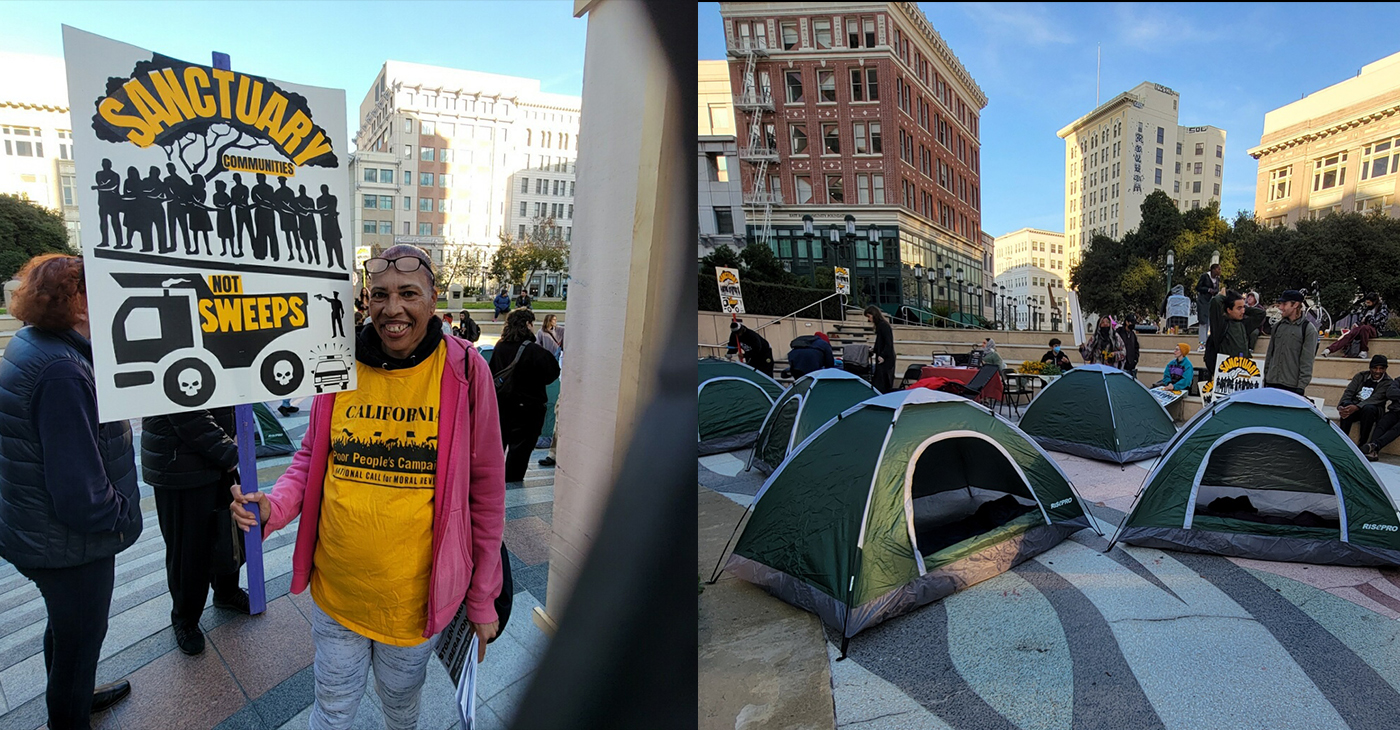
By Post Staff
Houseless rights advocates gathered in Oakland, San Francisco, Los Angeles, and other city halls across California and Washington state this week protesting increased sweeps that followed a U.S. Supreme Court decision over the summer.
The coordinated protests on Tuesday in San Francisco, Oakland, Vallejo, Fresno, Los Angeles and Seattle, were hosted by Poor Magazine and Wood Street Commons, calling on cities to halt the sweeps and focus instead on building more housing.
“What we’re dealing with right now is a way to criminalize people who are dealing with poverty, who are not able to afford rent,” said rights advocate Junebug Kealoh, outside San Francisco City Hall.
“When someone is constantly swept, they are just shuffled and things get taken — it’s hard to stay on top of anything,” said Kealoh.
Local houseless advocates include Victoria King, who is a member of the coordinating committee of the California Poor People’s Campaign. She and Dr. Monica Cross co-chair the Laney Poor People’s Campaign.
The demonstrations came after a June Supreme Court ruling expanded local governments’ authority to fine and jail people for sleeping outside, even if no shelter is available. Gov. Gavin Newsom in California followed up with an order directing state agencies to crack down on encampments and urging local governments to do the same.
Fresno, Berkeley and a host of other cities implemented new rules, making it easier for local governments to clear sidewalk camps. In other cities, such as San Francisco, officials more aggressively enforced anti-camping laws already on the books.
-

 Activism4 weeks ago
Activism4 weeks agoOakland Post: Week of November 27 – December 3, 2024
-

 Activism3 weeks ago
Activism3 weeks agoButler, Lee Celebrate Passage of Bill to Honor Congresswoman Shirley Chisholm with Congressional Gold Medal
-

 Activism3 weeks ago
Activism3 weeks agoPost News Group to Host Second Town Hall on Racism, Hate Crimes
-

 Activism3 weeks ago
Activism3 weeks agoDelta Sigma Theta Alumnae Chapters Host World AIDS Day Event
-

 Business3 weeks ago
Business3 weeks agoLandlords Are Using AI to Raise Rents — And California Cities Are Leading the Pushback
-

 Arts and Culture1 week ago
Arts and Culture1 week agoPromise Marks Performs Songs of Etta James in One-Woman Show, “A Sunday Kind of Love” at the Black Repertory Theater in Berkeley
-

 Activism3 weeks ago
Activism3 weeks agoOakland Post: Week of December 4 – 10, 2024
-

 Activism2 weeks ago
Activism2 weeks agoOakland Post: Week of December 11 – 17, 2024


